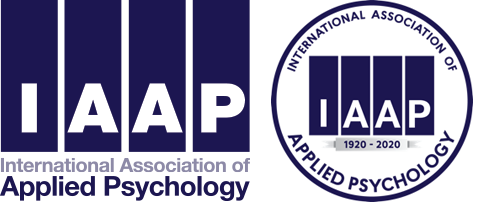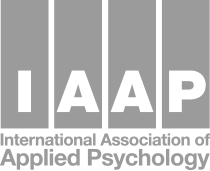Divisions
Most of the Association's work is achieved through its Divisions, Standing Committees, and Task Forces. The Divisions pursue the scientific concerns of IAAP members working in various sub-fields of applied psychology. IAAP has eighteen active Divisions.
Division 1 – Work and Organizational Psychology
Focuses on understanding, explaining and shaping attitudes and behaviour in organizational settings and identifying conditions that promote motivation, creativity, competency, teamwork, leadership, health and wellbeing, as well as the central role of human resources in strategic organizational planning.
Division 2 – Psychological Assessment and Evaluation
Deals with the development of educational and psychological tests and their administration, the expansion of state and national educational testing programs, and the use of tests in work and clinical contexts. It also involves issues of test construction, administration and scoring, as well as adaptation from one language and culture to others.
Division 3 – Psychology and Societal Development
Is concerned in part with the ways psychology can contribute to human well-being at a societal level involving issues such as health, education, gender equality, ethnic tolerance, intergroup relations and even political disputes. Primary emphasis, however, is placed upon understanding how these are affected by different histories, cultures, ethnicities and epistemologies, and thus the call for applications of psychology to be cognisant of these differences.
Division 4 – Environmental Psychology
Examines the interactions between people and their physical settings and the effects that one has on the other. Emphasis is upon enhancing this relationship by improving society’s investment in the built environment (buildings, streets, parks, the atmosphere), and reducing its negative aspects, especially in areas such a poverty, crime, terrorism and climate change, for example.
Division 5 – Educational, Instructional and School Psychology
Aims to help every student achieve the highest possible degree of maturity, including intellectually, emotionally, physically and socially, and how this is influenced by factors ranging from family, school, community, society and culture to diverse teaching methods, curriculum and a school environment that promote curiosity and encourages creativity.
Division 6 – Clinical and Community Psychology
Clinical Psychology focuses on understanding, preventing, diagnosing and treating psychological, cognitive, emotional, developmental, behavioural and family problems in children, adolescents and adults. Community Psychology is concerned with building competencies, behavioural changes and agency in individuals, communities and societies, thereby enhancing the quality of life at all three levels.
Division 7 – Applied Gerontology
Is typified by three areas of interest: age (concerned with difference between people of different ages), aging (deals with changes in functioning across the life span), and the aged (focused upon the elderly). Essentially the aim is to help people adjust to age and aging so as to add life to years rather than years to life, especially through having a positive self-perception on aging and keeping active both physically and mentally.
Division 8 – Health Psychology
Focuses upon explaining and changing health-related behaviour and on the role of psychological processes in health, illness, and healthcare delivery. Topics include symptoms and their investigation; cognitive, emotional and behavioural responses to illness; cognitive behavioural interventions; and treatment behaviour.
Division 9 – Economic Psychology
Promotes and discusses research, as well as policy making, on the interface of psychology and economics including topics such as money management, spending, saving and credit use and debts as well as financial and psychological preparation for retirement, money and inflation, felt inflation and consumer spending, and contra-productivity such as tax non-compliance, shadow economy and fraud.
Division 10 – Psychology, Law and Ethics
Although starting as a combination of the two separate disciplines of psychology and law, the field has emerged as one in its own right with its own epistemology, experimental techniques, and expertise. Within the field, however, there are two areas of specialisation. One is based upon experimental psychology, epitomised in research into eyewitness testimony. The other is clinically oriented of which an example is the assessment of recidivism.
Division 11 – Political Psychology
Examines human behaviour in a wide spectrum of settings, mainly national and international, in which psychology and political matters converge. Topics, for example, range at one level from voting behaviour and political extremism through to nuclear threat and terrorism, and at another from their associated motives and attitudes (such as changing attitudes, especially among adolescents, to war and peace) through to conflict resolution and negotiation.
Division 12 – Sport Psychology
Sport Psychology is concerned with the study and application of psychological and mental factors that influence and are influenced by participation in physical activity in general, and in sport, exercise and physical education. Sport psychology may be divided into three main areas: psychology of motor learning, exercise psychology and applied sport psychology. Each of these areas has contributed substantially to the understanding of humans in movement.
Division 13 – Traffic and Transportation Psychology
Traffic and Transportation Psychology is substantially concerned with the what, the how, and the why of road safety. As well it is heavily involved in the field of evaluation of countermeasures, including work in simulators where research is often multi-disciplinary in nature involving engineers and statisticians. Specific areas in which Traffic Psychology is particularly visible include seat belts, behavioural measures relating to enforcement, the development of road signage, speed limits, driver distraction, and the older driver licensing question (when should people quit?).
Division 14 – Applied Cognitive Psychology
Concerns applications of cognitive studies arising out of interactions with allied fields such as cognitive ergonomics, psychophysics, cognitive neuropsychology, engineering psychology, human factors engineering, cognitive engineering, new information technologies, computer supported cooperative work (CSCW), cyberspaces and virtual life research, neuro-ergonomics, psychology of learning and instruction, natural language processing (speech competence, reading, writing), the legal process (eye-witnesses, face and voice identification), decision making, conflict resolution as well as creativity research and training.
Division 15 – Students and Early Career Psychologists
Aims to promote and support a network of students who share a common interest in international development, teaching, trends, applications, and research in applied psychology. Activities include exchanging scientific knowledge; sharing useful information for students such as mobility programmes, scholarships, research grants, study and work abroad; and promoting international and cross-cultural research.
Division 16 – Counseling Psychology
Aims to help individuals, families, groups and organizations with their educational, developmental and adjustment concerns and in so doing employs a wide range of assessment and intervention strategies. Generally speaking clients experience moderate adjustment and psychological problems as opposed to severe psychopathology, interventions are short-term, service is out-patient rather than in-patient, the context is frequently educational or work, and emphasis is upon preventative interventions.
Division 17 – Professional Psychology
Places a strong emphasis upon evidence-based practice and covers a wide range of matters of central interest to practicing psychologists. These include accreditation, registration, quality and standards, supervision and mentoring, ethics, service delivery, workplace conditions, advertising standards, technological orientation, and political orientation and advocacy.
Division 18 – History of Applied Psychology
Fosters an historical approach to understanding, developing and reinforcing the institutional identity of our discipline. It encourage the preservation of technical reports in congresses and journals, qualitative and quantitative data collection procedures, and archival technique to keep safe documents that may well serve to maintain the identity of a tradition, a school or a national development.
Join a Division, or 2, or 3, or 4!
If you are a member of IAAP in good standing, you may join up to four Divisions.
To join one or more divisions, decide which ones (up to 4) that you want to join.
Re-Join IAAP and Re-Connect with Applied Psychology Friends and Colleagues World Wide!
If your membership is no longer current, renew your membership using this information:
IAAP Dues Renewals

